Here is the transcript of a lecture I delivered for RTF on the subject of Frederick Douglass.
It is a pretty heated situation in the United States right now, pretty much likened to a second civil war in the sense of there being a clash as to what is to be the identity of the United States going forward. This of course calls into question, what was the identity of the United States from the past, and what are the reasons we would have of either continuing that legacy or uprooting it moving forward.
One question I would ask people in thinking about this is if we are unable to have any form of respect for the past, can we have respect for the present or even the future?
If we think, for instance within the United States from the perspective of an American citizen, if we do not think there was anything good about American history, what sort of identity it formed and its relationship to others internationally, how are Americans supposed to think of themselves in the present and the future? How is the world supposed to think of the United States?
I am going to layout a few questions for us to think about throughout this lecture that are a bit philosophical in nature, because Frederick Douglass really is a way (at least for myself) to approach these very large questions.
There are a lot of mixed characters in the history of the civil war but I think Frederick Douglass is one of the most trustworthy ones we can use as a guide in looking at the civil war period in particular.
One question we should ask ourselves is, do we blame the individual or the system the individual was born into for injustices? We should ask ourselves, typically speaking is it the individual who is born unjust or is it the system that shaped them to be so?
If you want to introduce or reintroduce justice into an unjust system, which approach or action should we take that will lead to the greatest and most swift healing and correction of past injustices and set a course towards justice? That is, how do we go about correcting the wrongs committed in the past that we think are continuing to affect our present. What is the source of injustice? Are crimes past down through generations? Is prejudice inherited? Is it an issue of blaming or congratulating an individual for the apparent accomplishments their ancestors made as if they were their own actions? In other words, to not just be blamed but to be congratulated for things that have been done in your ancestral past. If you come from a line of slaves, does that oppression continue no matter the circumstance of the present? Are you born a victim? If you come from a line of slave holders, does the act of the oppressor carry forward into your being? Are you born an oppressor? Are you born with blood on your hands?
I remember reading as a teenager Charles Dickens, and I was really stricken at the time to his introduction to the fact that it was common in society to think that it was through blood that you found your station in life. For example, if your father was a baker, that meant that you were going to be a baker or at least, that you were going to stay within that class of society and that you should not expect to ever move up in your class within society. That is, your blood dictated what class you were born into along with your level of superiority or inferiority to others, as well as the opportunities you were going to have access to. It was even thought taboo for people to be friends with people outside your class in society. In marriages also this was taboo to marry outside of your class. And I remember thinking how horrible such a life would be, I hadn’t really experienced anything in life yet as a young teenager reading this, that whatever someone down the line in your ancestry decided to do as a career was to somehow dictate how your own life, your own station and very much your own personality as an individual in society would be. As if you were a clone of your father’s father’s father etc.
I think nowadays we recognise this as a bit of a ruse, it is still used today, but it was really rigid and prevalent during Dickens time. It was a ruse to keep peasants in their place. It was so they wouldn’t compete or be knowledgeable about the higher stations in society and the aristocracy. The more alien and unknown the world of the aristocracy the better, because such a person would never be able to question its merit and role in society. And no matter how disgruntled they may be with their lower station in life, they would never be able to challenge the justice of the whole thing, for it would seem like questioning the gods on Mount Olympus. That you were completely powerless in affecting change one way or another.
I find that there is a disturbing overlap in the kind of thinking that is going on in the United States today, a different sort of warped version of the same thought…which is, are we what are blood is? Do we inherit the actions and decisions of our father’s father’s father etc. Are we condemned, as in a form of purgatory, to relive over and over again the act of the oppressor and the suffering of the oppressed? Are we back to the vicious cycle of an eye for an eye with no end in sight? Are we no more or no less than the actions of our ancestors? Have we no choice but to be a product of our historical experience and present cultural norm? Who decides the present cultural norm? Or, do we have the ability to question such trends and oppose them if we disagree? Do we dare challenge the gods on Mount Olympus?
So the question I want us to have in our minds throughout this lecture is the fundamental core of the act and receiving of oppression. How does one become free from this? What is it to be free? Can oppression or freedom be something that is passed down?
This lecture is going to predominantly focus on the period of the American Civil War and the role of Frederick Douglass during this period, however, I think to give us some context as to how America found itself in such a situation where it was ready to tear itself into pieces or that the risk was that it would be torn into pieces. We should review some key points in history leading up to this point.
Reading the points from the slide above, we should ask ourselves, why did European families decide to make such a perilous journey to the Americas to a land they hardly knew anything about with no assured prospects?
At the time in Europe, they had just gone through almost uninterrupted warfare for over a century, and were presently going through the Thirty Years War between the Protestants and Catholics, which was one of the most violent wars in European history. You also had the plague which had occurred not long before then. You had rampant poverty and famine, pestilence and the death rate was horrifying. There was not a very bright future for most people in Europe which had descended into such chaos that the stability of an optimistic future was really not certain.
It was recognised that one of the core reasons for Europe’s descent into madness was the unreliability of its kings, often being concerned more with their personal welfare than that of the people.
So, you had European settlers who tried to escape from this and created a settlement in Massachusetts Bay, called the Massachusetts Bay Colony.
Faced with constant threats from King Charles I of England to remove the rights he had accorded to colonists under the Massachusetts Bay Charter to establish a colony, John Winthrop replied back that if such a thing were to occur
“the common people here will conceive that his Majesty hath cast them off, and that hereby they are freed from their allegiance and subjection [to the Crown], and thereupon will be ready to confederate themselves under a new government.”
In other words, these settlers took a stand and said that if the policies of the Crown did not have the best interest of the people, then, they will have to assume that the Majesty “hath cast them off” and that they are now free to form a new government, free of the British Monarchy and Empire.
If we read the written works of the Winthrops and the Mathers, it was clear that they were very ambitiously pursuing to set in place a new system that was based on a Renaissance principle, that holds at its core imago viva dei, we are all made in the image of God. And though the Renaissance principle had accomplished great works in Europe, these works were not able to completely take hold in Europe. The Renaissance principle understood that how we determine our definition of the nature of humankind and of the individual is what affects everything else in our society. How we choose to organise our legal structure, our education, and how we organise our economy.
Economy today has been reduced to the lowest possible definition you could have of the nature of man, that in a lot of ways, we are treated no different from the experiments done on rats attached to a button that would stimulate the dopamine center in their brain and that would give them the most intense pleasure as an effect from pushing on a button. These experiments would show that a rat would be so distracted by this seeking out of pleasure that it wouldn’t even eat and would starve to death from being obsessed with just pressing on the button.
This is unfortunately the kind of view that we have of human nature that has laid the foundation for how the world’s economic system is to function today. That it is all about demand, no matter what the demand is. And without regard for the long-term consequences for a society that lives in the moment for too long.
A lot of people will say that they think this is all fluff about the Massachusetts colonists, since after all didn’t they all own slaves? I am going to address that in the next slides, but I wanted us to keep something in mind before we start addressing this; we are flawed creatures, and we will always be flawed.
However, does that mean we cannot improve ourselves? Is everything we do in life meaningless because we are flawed? Or can we still move ever closer to attaining wisdom? We recognise there is a great gulf between the fool and the wise man, but how did the wise man become wise? The same goes for the system of government we have instituted. They too, will always be flawed, but does that mean that we cannot improve upon them? How do we decide when a system must be completely scrapped and start anew vs. when the foundations of a system are in fact healthy and strong but we need to improve upon them, or correct our straying from it.
In order to answer this question, let us begin by reading an excerpt from Robert Ingraham’s essay “A Truthful History of America and the British Slave Trade” (apologies for the misspelling of his name in the slides):
In the 18th century, the British monarchy brought more than 6 million slaves out of Africa. This was an imperial policy that was under the control of the Monarchy, the Privy Council, the Bank of England, and the Royal Africa Company.
Slave traffic, much like the later opium/narcotics traffic with the East India Company and the Opium Wars, was a financial policy, with huge profits financing the London stock market and the Bank of England.
The colonists were resistant to these enforced British policies and their efforts underwent many reversals and crises but finally by 1776 the call went forth as a self-evident truth that all men are created equal and in 1789 a new republic was formed pledged to defend the general welfare and secure the blessings of liberty for future generations.
Contrary to how many treat the American Revolution today, as if it were about equal rights for whites only, white and black people fought side by side during the Revolution on the side of liberty from Empire.
Marquis Lafayette who organised French support and was instrumental in winning the American Revolution against the British, remarked during his 1824 tour of America (which was a very different America unfortunately by then) that he was astonished to discover the aggravation of the prejudices against the blacks saying that during the revolutionary war, black and white soldiers regularly ate meals together in the mess hall without hesitation. Thus, curious as to where did the prejudice that was rampant during the 1824 period come from.
Gerald Therrien gave a great class for the Rising Tide Foundation on the Haitian Revolution (Toussaint Louverture, the Haitian Revolution and the Evolution of the American Republic) which is a great reference. Below is a very useful slide that I grabbed from Gerry’s class from last week, which goes over in a quick and efficient manner how slavery was abolished in many of the states and the importation of slavery banned.
So, the United States was moving in a very clear direction to ending slavery after the independence from the British Empire.
Another question we should ask is:
I am going to keep this as an open question for now because it will be when we reach the point of Frederick Douglass that we are going to start addressing that question directly. In the meantime, there are some important points that we should be aware of which are listed in the slide below (the pictures are of John Jay in the top right, followed by Alexander Hamilton and Benjamin Franklin):
In 1790, shortly before his death, Ben Franklin, together with Alexander Hamilton and other notables, submitted a petition to Congress proposing that all children born on U.S. soil after 1808 would be born free, thus eliminating slavery for future generations. By 1796, every state in the nation – north and south – had shutdown the slave trade.
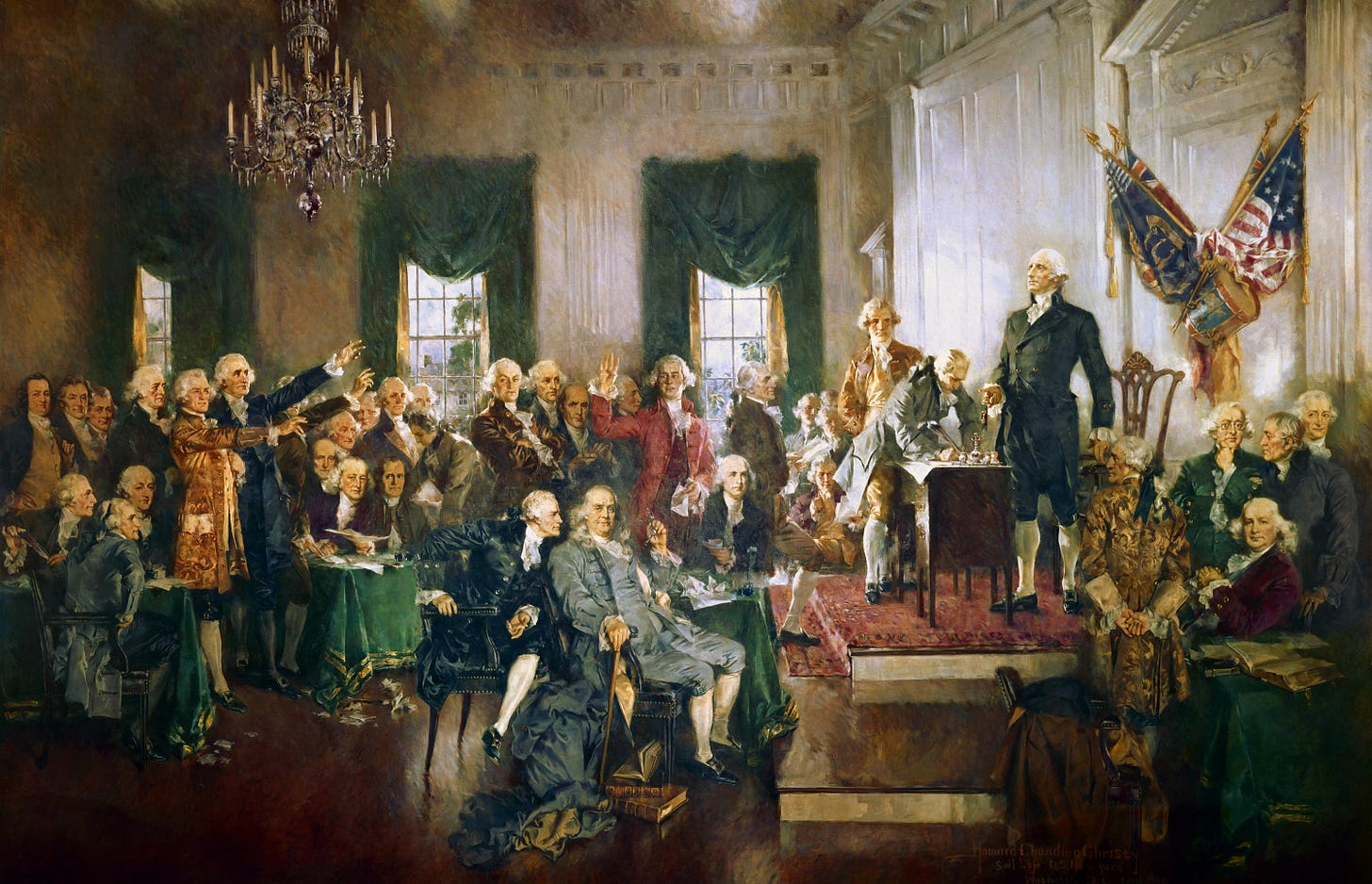
I won’t have enough time to go through what Alexander Hamilton did for the economy of the United States, I will summarise it (you can refer to Nancy Spannaus’ Rising Tide Foundation lecture “Hamilton vs Wall Street: The Man vs the Myth” for more details on Hamilton).
An important point we should be aware of is that Hamilton introduced a form of economy that was unprecedented at the time and stood in direct opposition to the slave system economy of the British Empire. Hamilton, having introduced a machine-tool industry approach vs a slave power approach.
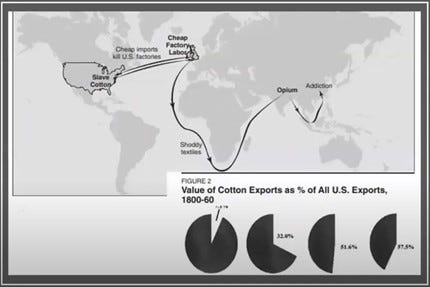
Between 1801 and 1833 the entire economic system of Hamilton was dismantled (Hamilton was killed by Vice-President Aaron Burr in 1804). The credit of the nation was placed into the hands, once again, of London financiers who controlled the world’s gold trade along with international finance. Wall Street emerged as London’s junior partner, and after 1815, the slave hub of New Orleans previously part of the French Empire would become the banking capital for the cotton trade and the expansion of the slave economy. By 1840, New Orleans possessed 12% of the nation’s banking capital. The South became the cotton plantation of the British Empire.
Between 1801 and 1835, U.S. cotton exports grew from 100,000 bales to more than a million, reaching four million bales by 1860. 80% of this cotton was shipped to Britain, where over 20% of the British population were directly or indirectly involved in producing cotton textiles.
The financial triangle of London, Wall Street and New Orleans financed and managed this slave economy. In the map above you can see the general structure of the world cotton economy. India’s textiles were destroyed such that British textiles could have world dominance and India was given in its place to be a producer of opium, which was then fed to China as a means to weaken China. Opium was pushed on the Chinese creating a crisis of addiction. This was part of the philosophy of free trade economics, that if there is a demand, in this case opium, the country had not right to intervene on the people’s choice for that demand. China disagreed with this British free trade policy which led to the two Opium Wars (1839-1842 and 1856-1860). China lost and was forced into what is referred to as their “Century of Humiliation.”
When we look at the list of American Presidents, unfortunately there were a lot of either disappointing presidencies or outright evil ones (apologies the list reads from right to left and a sliver of the slide is cut out).
By the time the United States had reached the presidencies of Andrew Jackson and Martin Van Buren, the founding principles of the Republic (as discussed thus far in this paper) took a sharp turn. Under the presidencies of Jackson and Van Buren, the U.S. Bank was taken down along with the protective tariff and transport building program and instead radical free trade was put in its place (for more on this refer to Anton Chaitkin’s excellent papers “Lincoln’s American System vs. British-Backed Slavery” and “The Lincoln Revolution” for further details to the economic vision of Jackson and Van Buren vs that of Hamilton, Lincoln and Henry C. Carey.
To be fair, presidents that followed after this, such as William Henry Harrison and Zachary Taylor were not for this, but their presidencies were cut short due to mysterious deaths.
This was the world to which Abraham Lincoln would take the helm as President of the United States, and thus had a very big job in terms of “cleaning up.”
Anton Chaitkin writes in “Lincoln’s American System vs. British-Backed Slavery”:
“Over the three decades up to 1860, with financial power detached from promoting industry, plantation slavery was becoming the leading feature of the U.S. economy, and slaveowner politicians dominated Washington.
More than 75% of slave cotton was exported. Cotton soon constituted over half of the value of U.S. exports.
American slave cotton was now the centerpiece of the British Empire’s world cheap-labor system.”
For those who haven’t read Frederick Douglass’ autobiography, I truly believe that it should be mandatory reading, most certainly for American citizens in their school system, but I would go so far as to say that it should be mandatory reading worldwide, because there is a lot we can learn from Frederick Douglass.
Two very important quotes that I think serve as a good introduction to Douglass are:
What Douglass meant by the first quote “that liberty is national and slavery is sectional” is that slavery may have existed in certain regions or states, however, the foundation of the United States was based upon liberty for all. And so, it was a process moving towards that, we have to understand that that is not something that can just happen overnight.
As to the second quote, as we are going to see, there are a lot of people during the Civil War who make it out to seem like it is one or the other, either the liberation of the slave or the salvation of the Union, but that both could not occur. Douglass always made the point that the war was about both and that it had to be about both.
Frederick Douglass was born in Talbot County in the state of Maryland. Maryland had a one point completely abolished slavery but by the time Frederick Douglass was born, the state was unfortunately completely dominated by cotton plantations. We don’t know the exact date of his birth because they weren’t told those sort of things, but he gathers he was born February 1817.
The name given to him by his dear mother was, in the words of Douglass “no less pretentious and long” than Frederick Augustus Washington Bailey, which is interesting since he was named after a Roman Emperor and the first American President. Frederick’s mother was believed to be the only slave in the region who knew how to read.
Frederick recalls that in his youth:
“I was just as well aware of the unjust, unnatural, and murderous character of slavery, when nine years old, as I am now. Without any appeals to books, to laws, or to authorities of any kind, to regard God as ‘Our Father’ condemned slavery as a crime.”
Already, by the age of nine, Frederick had set himself upon not only the idea of escape from this destitution but was always also mindful to an education wherever he could find it.
Luckily, in this unhappy state his only adult friend Miss Lucretia, daughter of Captain Anthony the slaveholder of Frederick, arranged for Frederick, at the age of ten, to be sent away from the plantations to live in Baltimore with her husband’s brother Hugh Auld.
It was in Baltimore that Frederick would learn how to read. It was Mrs. Auld who immediately took it upon herself to teach Frederick how to read. She was so happy with the quick progress young Frederick was making that she wanted to show this to her husband, who quickly intervened. As Frederick Douglass explains it, it was as if she were being introduced to the hierarchy of the master-slave system for the first time; that slaves are not supposed to be taught how to read and that this is the most dangerous thing you could possibly do. The idea was according to such slaveholders as Hugh Auld, that if a slave did learn how to read, they would quickly want more than a life of a slave. It is a sort of recognition of the unlawfulness of the master-slave relationship because if slavery is a natural condition, what would it matter if a slave learned how to read or not if the assumption is that they were naturally inferior?
Below is an excerpt from Douglass’ autobiography:
The point that Frederick Douglass is making with this quote, is that he was very close with Mrs. Auld, she treated him at first very kindly, almost like a son at the beginning of his stay until Mr. Auld told her what the relationship was supposed to be. She later became more antagonistic to Frederick’s attempts to read than Mr. Auld himself. Douglass describes this as, by her having to justify this relationship to herself of master and slave, it changed who she was and it made her a worst person than she naturally would have been from her own instinctive reaction to young Frederick.
So, Douglass in a very loving way recounts “Nature had made us friends, but slavery had made us enemies…We were both victims to the same overshadowing evil, she as mistress, I as slave. I will not censure her harshly.”
So, in other words, the act of master-slave destroys both parties’ humanity. It destroys both of their accesses to be a human being.
Years go by and at around the age of fifteen or sixteen, Frederick is sent back to the plantations (over a family squabble), and not surprisingly is found to be wholly unfit for a life of hard labour as an obedient slave. He is thus promptly sent to “Covey, The Negro Breaker” to lodge with for a period of one year.
For six months, Frederick was whipped and beaten on a regular basis. From the dawn of day till the complete darkness in the evening, he was kept hard at work in the fields, and was worked up to the point of his powers of endurance.
Until one day he decides finally that it is better to resist and risk the consequences than continue to live such a contemptible life as a mere brute. He decides one day to simply refuse to be treated as an animal, not to strike back but to oppose the striking.
As Frederick states:
“A man without force is without the essential dignity of humanity. Human nature is so constituted, that it cannot honor a helpless man, though it can pity him, and even this it cannot do long if signs of power do not arise. He only can understand the effect of this combat on my spirit, who has himself incurred something, or hazarded something, in repelling the unjust and cruel aggressions of a tyrant. Covey was a tyrant and a cowardly one withal. After resisting him, I felt as I had never felt before. It was a resurrection from the dark and pestiferous tomb of slavery, to the heaven of comparative freedom. I was no longer a servile coward, trembling under the frown of a brother worm of the dust, but my long-cowed spirit was roused to an attitude of independence. I had reached the point at which I was not afraid to die. This spirit made me a freeman in fact, though I still remained a slave in form. When a slave cannot be flogged, he is more than half free. He has a domain as broad as his own manly heart to defend, and he is really ‘a power on earth’. From this time until my escape from slavery, I was never fairly whipped. Several attempts were made, but they were always unsuccessful. Bruised I did get, but the instance I have described was the end of the brutification to which slavery had subjected me.”
Douglass had suffered six months of brutal beating almost on a daily basis, many times near death, and worked hard in the fields such that Douglass reached a point where he asked himself the question, “Am I going to continue living my life this way?” And further, he decides that if he is to oppose it, it would not be through violence! He was going to resist, but not attack Covey. He had decided that he was to simply defend himself. And thus one day, he engaged in a 2-3 hour sort of wrestling with Covey, where he defended himself from being beaten by him. Interestingly, for Covey to stay face (since he had a public reputation to uphold as “Covey the Negro Breaker”), Covey for the remaining six months left Douglass alone and never laid a hand on him.
Frederick Douglass makes the remark in his autobiography that the slaves that were treated the most brutally were the most meek. That nothing was so horrifying to a slaveholder than a slave who could resist with dignity, because a slaveholder looks absolutely powerless and ridiculous in such a situation, and it encourages the other slaves to join in in resistance.
To make a long story short, Frederick Douglass does eventually escape from Baltimore to New York at the age of twenty-one.
I think it important to share an excerpt of Douglass’ first impression upon arriving in the North where he compares the two economic systems; with the North not reliant on slave power and the South completely reliant on slave power at the time:
“Living in Baltimore as I had done for many years, the reader may be surprised when I tell the honest truth of the impressions I had in someway conceived of the social and material condition of the North. I had no proper idea of the wealth, refinement, enterprise and high civilisation of this section of the country…I had been taught that slavery was the bottom fact of all wealth. With this foundation idea I came naturally to the conclusion that poverty must be the general condition of the people of the free states. A white man holding no slaves in the country in which I came, was usually an ignorant and poverty stricken man. Men of this class were contemptuously called ‘poor white trash.’ Hence, I supposed that since the none slaveholders of the South, were as a class, ignorant, poor and degraded, the non-slaveholders at the North must be in a similar condition.
New Bedford [Massachusetts], therefore, which at the time was in proportion to its population, really the richest city in the Union [the North], took me greatly by surprise, in the evidences it gave of its solid wealth and grandeur. I found that even the laboring classes lived in better houses, that their houses were more elegantly furnished and were more abundantly supplied with conveniences and comforts, than the houses of many who owned slaves on the Eastern Shore of Maryland. This was true not only of the white people of that city, but it was so of my friend Mr. Johnson [who was a black man who was working for the Underground Railroad and got Douglass established in New Bedford]. He lived in a nicer house, dined at a more ample board, was the owner of more books, the reader of more newspapers, was more conversant with the moral, social and political condition of the country and the world, than nine-tenths the slaveholders in all of Talbot County.
I was not long in finding the cause of the difference, in these respects, between the people of the North and South. It was the superiority of educated mind over mere brute force…One of the first incidents which impressed me with the superior mental character of labor in the North over that of the South, was the manner of loading and unloading vessels. In a southern port twenty or thirty hands would be employed to do what five or six men, with the help of one ox, would do at the wharf in New Bedford. Main strength - human muscle - unassisted by intelligent skil,l was slavery’s method of labor. With a capital of about sixty dollars in the shape of a good-natured ox attached to the end of a stout rope, New Bedford did the work of ten or twelve thousand dollars, represented in the bones and muscles of slaves, and did it far better.”
With Frederick Douglass’ remarks on New Bedford, Massachusetts, you have to wonder, why did slavery exist in the United States when you had more wealth and efficiency in production with a machine-tool industry?
Frederick Douglass, within months of him moving to New Bedford, Massachusetts, is introduced to the Abolitionists. And he is invited to speak on tours with the Abolitionists. His role in this is to speak about his experience as a slave and to get the audience members to feel sympathy for him, but in a somewhat limited fashion since the thing was, Frederick Douglass being the smart young man that he was, got bored saying the same story over and over again. He wanted to start sharing his philosophical thoughts on the nature of slavery. There is a very interesting response from his Abolitionist friends on this matter:
“New views on the subject were being presented to my mind. It did not entirely satisfy me to narrate wrongs, I felt like denouncing them. I could not always curb my moral indignation for the perpetrators of slaveholding long enough for a circumstantial statement of the facts, which I felt almost sure everybody must know. Besides, I was growing and needed room.
‘People won’t believe you were ever a slave Frederick if you keep on this way,’ said friend Foster. ‘Be yourself’ said Collins and ‘tell your story.’ ‘Better to have a little of the plantation speech’ was said to me. ‘It is not best that you seem too learned.’ These excellent friends were actuated by the best motives and were not altogether wrong in their advice. And still, I must speak just the word that seemed to me the word to be spoken by me.
At last, the apprehended trouble came. People doubted if I had ever been a slave. They said I did not talk like a slave, look like a slave or act like a slave. And that they believed I had never been South of Mason-Dixon’s line.”
There is a lot to think about with this excerpt. In terms of his Abolitionist friends who think that slavery is wrong, and yet want to curb Frederick Douglass’ mind who has just recently escaped and is absorbing everything like a sponge. They want to curb his development because they are fearful that Douglass will do the very thing he is supposed to be doing, break the prejudices around slavery.
That is the irony of the whole affair. That he did not “talk like a slave, look like a slave or act like a slave.” Well, he was never truly a slave! He never accepted that identity for himself.
And thus, it begs the question does being a slave amount to a physical condition or does it amount to a mental condition?
For those of us who are not familiar with William Lloyd Garrison, we will read some of his quotes from his newspaper The Liberator and then discuss him further (taken from Anton Chaitkin’s “Lincoln’s American System vs. British-Backed Slavery.”)
Garrison was a part of a branch of the Abolitionists, to be clear not all Abolitionists thought this way. But in the grouping that Garrison represented they felt very strongly that the country should be broken in two, that those against slavery should form one country and those for slavery should form another country. And they were also saying that people shouldn’t vote in the elections on this matter, which is interesting because they have Abraham Lincoln who became president no thanks to their support in 1861.
Frederick Douglass was very influenced by Garrison at the beginning, him having just come out of slavery, there were a lot of things he had to catch up on. And he was under the impression for a prolonged period that the U.S. Constitution and the Declaration of Independence actually had pro-slavery statements within them. This impression continued until he started his own newspaper The North Star, and he started to read these things for himself feeling a direct responsibility in educating the public with his newspaper, he didn’t feel comfortable at that point in just repeating things he was told.
Before I go over this discovery of Douglass in more detail, I wanted to share with you an important quote by Lord Robert Cecil who later became Marquess of Salisbury, a very prominent position in British peerage and I think was the most famous of all the Marquesses of Salisbury and served three times as Prime Minister of Britain. And this is what he had to say during the American Civil War:
Just to be clear here, he is referring to England as the natural ally of the Southern states and that England is the natural rival politically and commercially of the Northern states. Now, I think from what we have reviewed that it is very clear that what he is referring to is the machine-tool industry approach vs the slave system approach in economy.
In another lecture, I have discussed how Britain and France were ready to intervene in support of the South if it were not for Russia’s backing of the Northern states with their navy on both coastlines ready to defend Lincoln’s Union if such an intervention were to be made by Britain and France (you can refer here for the lecture/transcript on this subject titled “Why Russia Saved the United States”).
Frederick Douglass would eventually distance himself from the Garrison Abolitionists, he never attacked them but rather naturally became distant because he made the stance that the preservation of the country was absolutely important, that the U.S. Constitution was in fact not pro-slavery, and also he thought to vote was quite important.
Below is an excerpt from Douglass’ autobiography:
On this same vein, I would like to share an excerpt from Douglass’ speech “What to the Slave is the Fourth of July?”, which is likely the most famous speech of Frederick Douglass and was definitely the most circulated speech this past Independence Day (in reference to when this lecture was delivered in August 2020). It made me wonder, in terms of the context in which people were circulating Douglass’ speech this past July, whether they had stuck reading to the very end, because this excerpt from the very end of his speech is somewhat contrary rather than supportive of their view that the founding fathers and the U.S. Constitution were pro-slavery.
Interesting. If the founding fathers wrote the principles to which the country would be founded upon as something against slavery, how do we respond to the present-day injustices for the mixed history of the United States? Is it a matter that we should tear the whole thing down?
One reason why this speech by Douglass was made his most famous was because at the beginning of this speech he is saying (paraphrasing) ‘Why did you invite me here to celebrate Independence Day with you all? Is it to mock me? Because its Independence for you, but its not Independence for me and my brothers and my sisters.’ The point Frederick Douglass was making was that slavery was not the nature of the founding principles of the country, that the country was still young, and it was his hope that they would return to those founding principles.
So, that really changes then how we should be regarding the United States. That the history of the United States is not just some sick, hypocritical stance on superiority and freedom. If the philosophy of the founding documents of the United States was an unprecedented formation of a republic by the people in opposition to the slave system of empire, which dominated the world up until that point, then we really need to think about that very carefully. We need to think carefully about whether it is right to attack the country wholly, to tear down its history, its historical buildings and its ideas. And what are we going to replace it with? Because the system that we live in today, as the world economic system, is a very unjust system. But where did that idea come from and what allowed it to become prevalent?
If we look at the Hamiltonian system, it affected Sun Yat-sen’s approach to China (refer here for further details “The Silk Road Roots of America and the American Roots of the New Silk Road”) and it also heavily influenced Russian economics especially under Tsar Alexander II (known as the “Liberator”) and was also heavily promoted by Sergei Witte (refer to my lecture/transcript “Why Russia Saved the United States” and “The Forgotten History of a Brotherhood”) it also influenced Germany with the setting up of the “Zollverein” which was strongly advocated for by Friedrich List.
This economic vision that begun with Hamilton and was continued forth by Henry C. Carey, known throughout the world as “The American System” had very positive effects in the world. As the United States reverted back to slavery from outside intervention, the world itself which had this glimmer of hope had also been largely dragged back into that system of empire.
Though we see now with China, most notably with the Belt and Road Initiative, a revival of the Hamiltonian system for how world economy should be. This system was always in opposition to slavery and was always with the idea of equality for all of humankind, which are inseparable.
Below is an excerpt from Douglass’ autobiography:
In that last paragraph, Douglass is referring to the Abolitionists, who thought in order to be free from slavery the country had to be cut into two.
Abraham Lincoln would be elected president of the United States and inaugurated March 4th, 1861. Douglass said of this occasion:
Douglass started to use his newspaper the North Star to recruit black soldiers to the cause of the Union’s war against the Confederate South. The thought was that black soldiers joining the Union would prove their mettle in the cause for emancipation, however, these were hard days since black soldiers were not given equal treatment nor protection in the Union army. They also risked if captured by the South being enslaved, a sentence in Douglass’ words “worse than death.” Douglass had been assured that equal treatment would eventually occur but it was too slow moving in his eyes and he refused to continue recruiting black soldiers into the Union army.
It was at this point that Douglass was invited to meet with President Lincoln, for the first time, and discuss his concerns over the matter.
Douglass describes his first meeting with Lincoln in his autobiography:
“I was never more quickly or more completely put at ease in the presence of a great man than in that of Abraham Lincoln…Long lines of care were already deeply written on Mr. Lincoln’s brow, and his strong face, full of earnestness, lighted up as soon as my name was mentioned…I at once felt myself in the presence of an honest man – one whom I could love, honor, and trust without reserve or doubt.”
One of the points of concern Douglass discussed with the President, was on the unfair treatment of black soldiers as POWs and suggested that the North should retaliate and commit the same treatment on their Southern POWs to dissuade this unequal treatment, to which Lincoln responded (excerpt is taken from Douglass’ autobiography):
“Retaliation was a terrible remedy, and one which it was very difficult to apply – that, if once begun, there was no telling where it would end – that if he could get hold of the Confederate soldiers who had been guilty of treating colored soldiers as felons he could easily retaliate, but the thought of hanging men for a crime perpetrated by others was revolting to his feelings…Though I was not entirely satisfied with his views, I was so well satisfied with the man and with the educating tendency of the conflict I determined to go on with the recruiting.”
Douglass had come into this meeting with Lincoln, with three main points that he wanted Lincoln to change his stance on and was determined that he was not going to carry on recruiting if the stance was not changed on these matters. He came out of the meeting with none of the points met in an immediate time frame, and yet, he continued to recruit because he was so impressed with Lincoln’s wisdom and trusted that Lincoln was indeed for the eventual emancipation of all slaves.
Here is a very beautiful quote from Douglass, having lived a little over twenty years as a slave, he remarks in his autobiography:
So Douglass understood, very much like Martin Luther King Jr., that it was a question of uplifting everybody and that even though slavery was a very brutal physical rule over a person, that in a slave system economy it destroys the humanity of every person within that society. And there are a lot of white people who are kept poor and oppressed within such a system as well.
Martin Luther King Jr., in his sermon “The Drum Major Instinct,” points out the irony of these poor white people who think that they are better than black folk. These white people are being sent to the Vietnam War as well, and coming back all mangled. They can barely afford to put food on their table. They should be walking in the streets with black folk addressing the overall injustice of the system. But some of these white people are so foolish as to think that they are somehow better off because of the mere color of their skin.
This is a very important excerpt from Frederick Douglass taken from his autobiography, for those who say that Lincoln was just a utilitarian in his approach to ending slavery. I think that Frederick Douglass completely disproves that slander with this following excerpt:
President Lincoln would be selected to continue a second term and was inaugurated on March 4th, 1865, about one month after the official end of the Civil War. Lincoln would be assassinated just a mere 41 days after his second inauguration.
Douglass writes, “His first inauguration arrested the fall of the Republic, and the second was to restore it to enduring foundations.” The fact that Lincoln’s leadership was savagely cut short was a tragedy for all who understood that the true foundation of the Republic was built upon the principle “liberty for all”.
In that sad moment, when the country heard of the death of Lincoln who was to bring them closer to this goal, Douglass states,
“We shared in common a terrible calamity, and this ‘touch of nature made us’ more than countrymen, it made us ‘kin’. ”
So “What was the Civil War really about?”
I would argue that it was about the emancipation of slavery but it goes further than how we generally think about such a question, which is not just the physical form of slavery that we saw prevalent in the South but it is a more pervasive form of slavery that we see in the general form of an economic system.
An economic system that is not just being pushed against the will of Americans, it was pushed on India, it was pushed on China, it was pushed on many countries. It was pushed on the British people themselves. This is the form of slavery that is all pervasive and that needs to be addressed. And that by recognising that that is the core point, where we can address all of these injustices at the same time, we don’t have to argue over which ones are more important than the other since they all stem from the same source.
I will end this lecture by sharing an excerpt from Douglass’ speech “On the Follies of Cheap Labor” (apologies for the small sliver missing from the slide):
So, what is the answer to the follies of cheap labor?
Below is a picture of the Centennial Exhibition, organised by Henry C. Carey, which occurred 100 years after the American Revolution. Truly a remarkable event in American history and it showed the exceptionalism of the Hamiltonian approach to economics that the United States had introduced to the world in the 19th century.
There was much optimism and headway for universal rights which offered opportunities that could be found nowhere else. Remember that the Statue of Liberty used to represent hope. This walked hand in hand with a focus on the country becoming a world leader in education and scientific progress. Nothing exemplified this further than the monumental Centennial Exhibition. It would be held in Pennsylvania, Philadelphia, Ben Franklin’s hometown, and would be at the center of this pioneering spirit.
Over ten million people came to see this exhibit from 37 participating countries! I think that makes it very clear, that this was not meant to be a system to lord over other countries but rather was meant to be shared and uplift all.
The importance of the Centennial Exhibit was an opportunity for the young country to display its very impressive inventions that had revolutionized its machine-tool industry, giving its economy a tremendous boost such that in a mere 100 years, this country had become a world leader in industry and wealth.
It is China’s Belt and Road Initiative that has revived this approach with their principle of “win-win cooperation” as opposed to the fallacious idea of a zero-sum game.
Lastly, for those who have a lot of this spiritual baggage from past injustices, I think that these quotes from Frederick Douglass are really important for how we should view ourselves in approaching the healing process, correcting the wrongs and moving forward.
Frederick Douglass actually had a bit of a joke section in his autobiography where he brings up certain responses he had to people’s ignorance and stupidity, or sometimes it was to help recenter someone with humour who was becoming overly demoralised by the situation, that they kind of became paralyzed as to what they could possibly do.
Douglass recounts a discussion with a friend of his:
“ ‘How do you feel,’ said a friend to me, ‘when you are hooted and jeered on the street on account of your color?’
‘I fell as if an ass had kicked, but had hit nobody,’ was my answer.”
I think that really gets at the core of how Douglass reacted to a system of slavery that attempted to be imposed on him, and yet he never accepted it. You see with the accomplishments he made in his life what were true barriers and what were just mere challenges that could be overcome. What is powerlessness and what is it to be powerful? What is it to be truly free? I think that Frederick Douglass is a very good role model for those of us who feel oppressed for whatever reason in the system that we are living in right now.
In terms of the healing process, Frederick Douglass was invited to visit his former “master” Captain Auld on his deathbed, over 25 years after Douglass had escaped to the North (Douglass’ “freedom” was eventually purchased by these rich ladies in England). It is a very beautiful section his Douglass’ autobiography where he says:
“But now that slavery was destroyed, and the slave and the master stood upon equal ground, I was not only willing to meet him, but was very glad to do so…He was to me no longer a slaveholder either in fact or in spirit, and I regarded him as I did myself, a victim of the circumstances of birth, education, law, and custom.
Our courses had been determined for us, not by us. We had both been flung, by powers that did not ask our consent, upon a mighty current of life, which we could neither resist, nor control. By this current he was a master, and I a slave, but now our lives were verging towards a point where differences disappear, where even the constancy of hate breaks down and where the clouds of pride, passion, and selfishness vanish before the brightness of infinite light.”
Douglass recounts that when he visited this old plantation site where he grew up, it is no longer a plantation, he was surprised at how people he knew when he was younger, the white people who were a part of this slave system, how happy they were to see him. Frederick Douglass had become very famous at that point as an orator. They treated him completely differently, I don’t think it is them being fake, but rather it shows the unnaturalness of the master-slave condition and that nobody really wanted it and that there was relief on both sides when it is removed.
Frederick Douglass goes on to say:
“If any reader of this part of my life shall see in it the evidence of a want of manly resentment for wrongs inflicted by slavery upon myself and race, and by the ancestors of…[those who once owned slaves], so it must be. No man can be stronger than nature, one touch of which, we are told, makes all the world akin. I esteem myself a good, persistent hater of injustice and oppression, but my resentment ceases when they cease, and I have no heart to visit upon children the sins of their father.”
I will end here with a quote from Abraham Lincoln:
Cynthia Chung is the President of the Rising Tide Foundation and author of the books “The Shaping of a World Religion” & “The Empire on Which the Black Sun Never Set,” consider supporting her work by making a donation and subscribing to her substack page Through A Glass Darkly.
Also watch for free our RTF Docu-Series “Escaping Calypso’s Island: A Journey Out of Our Green Delusion” and our CP Docu-Series “The Hidden Hand Behind UFOs”.




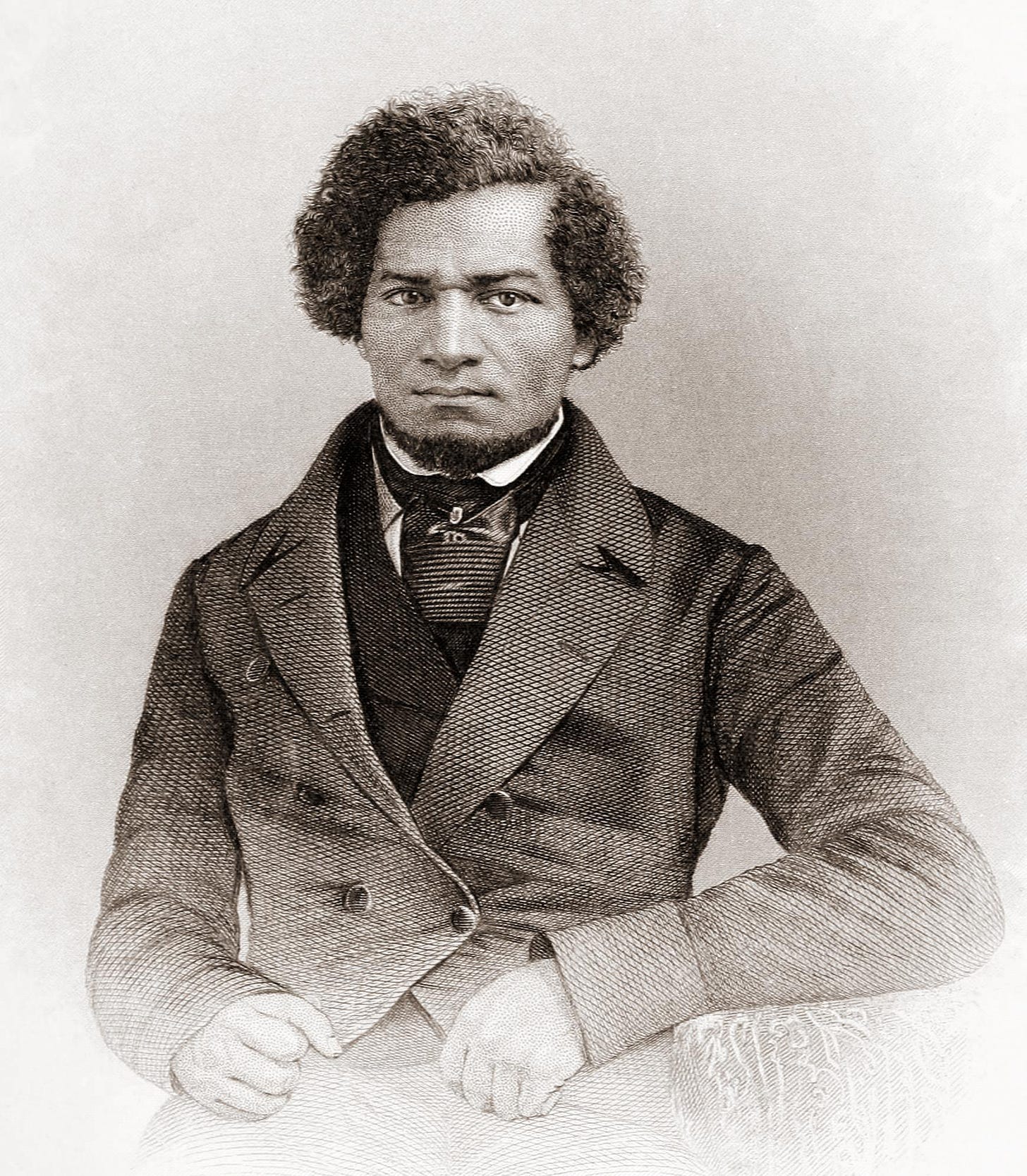
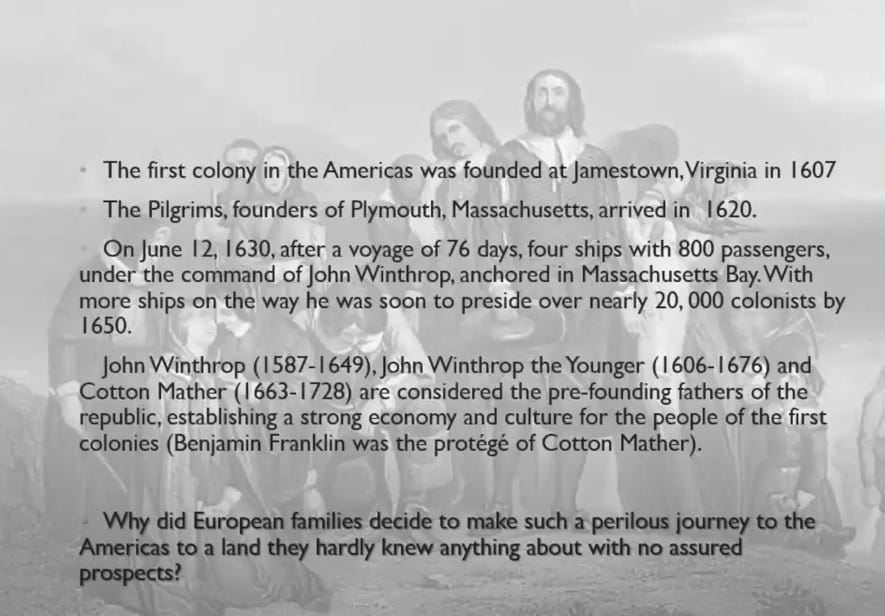
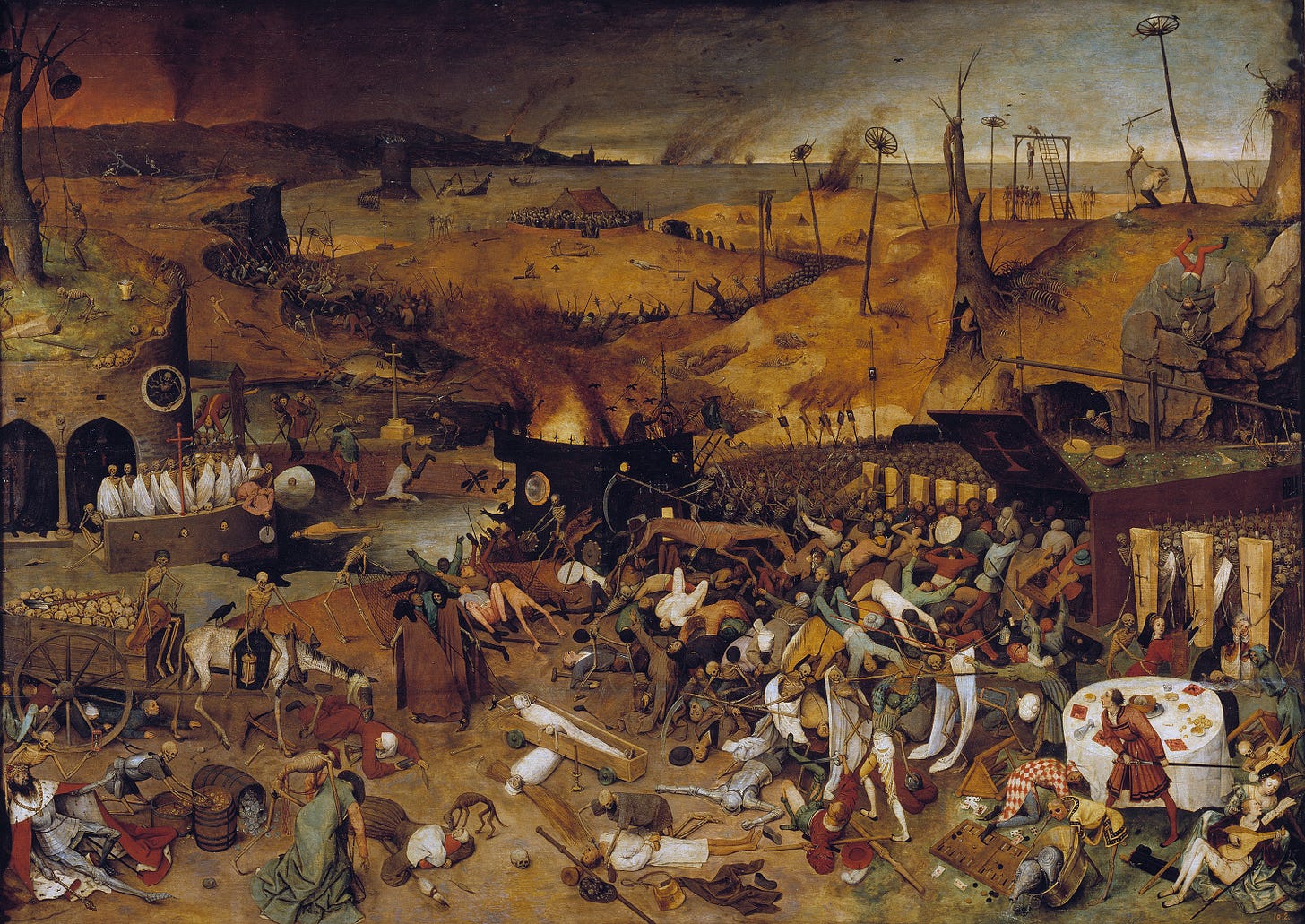
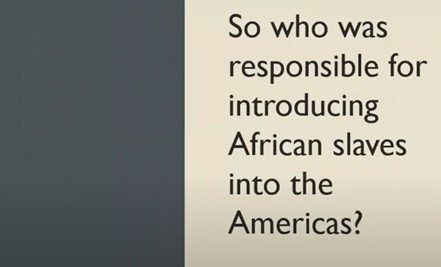
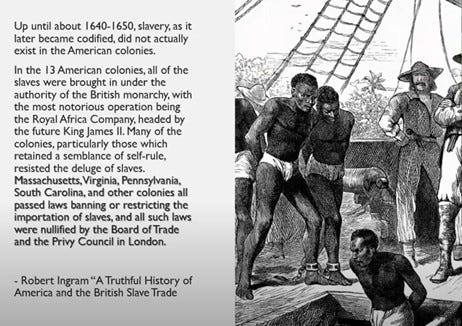
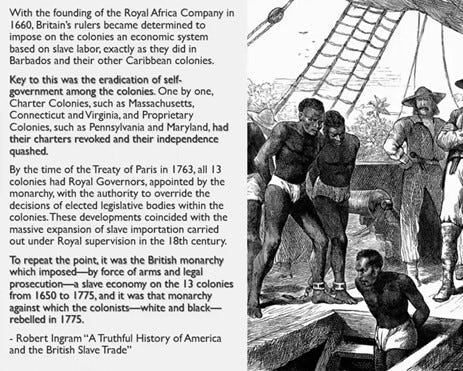
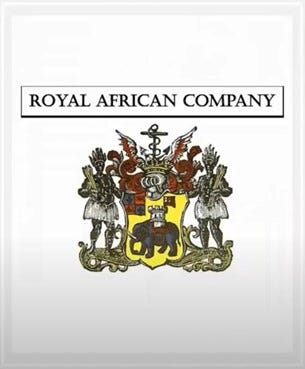
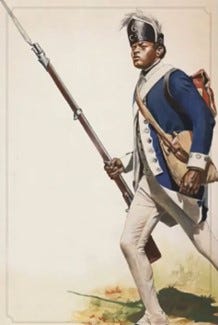
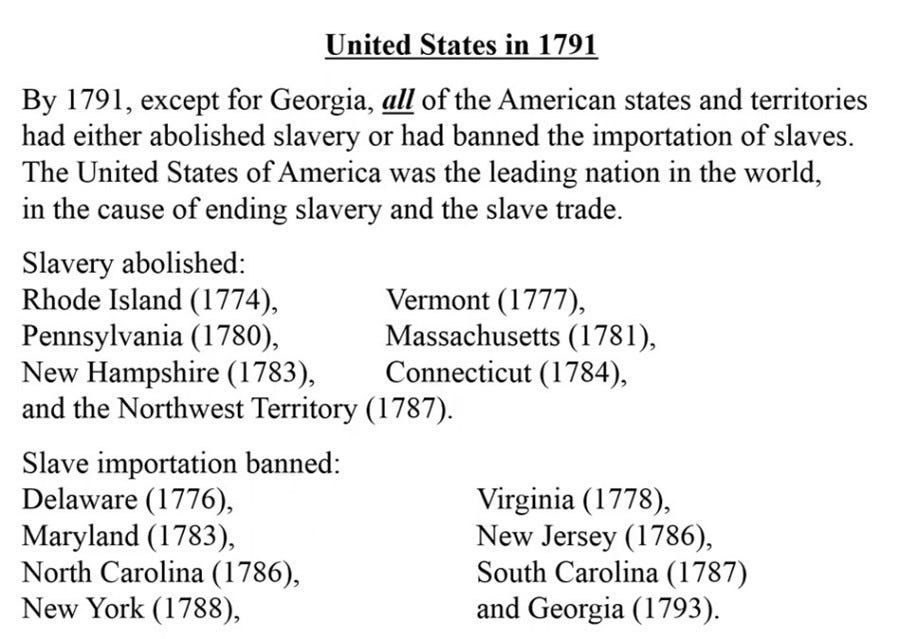

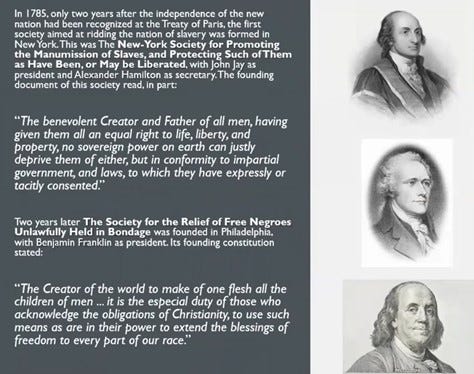
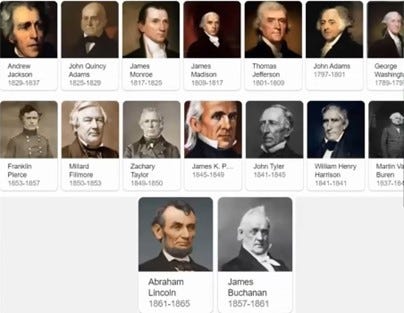
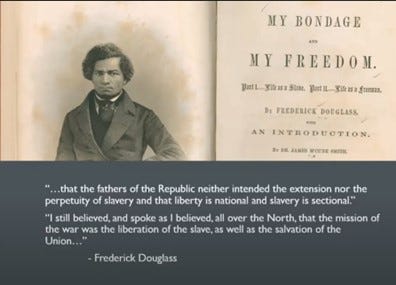
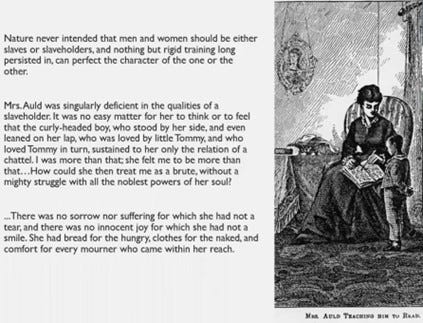
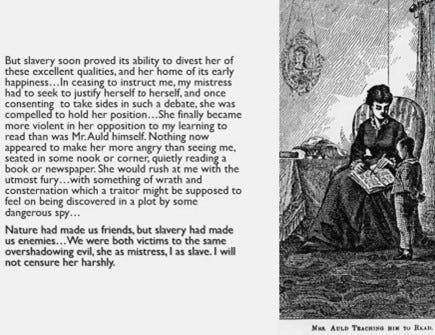
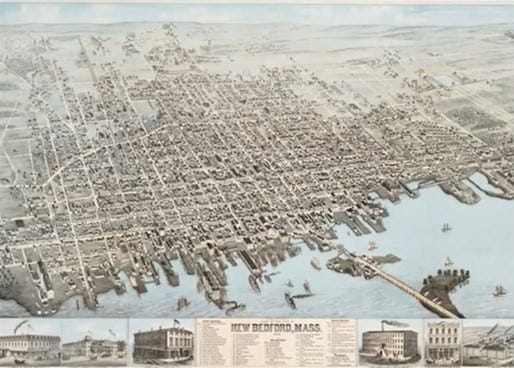
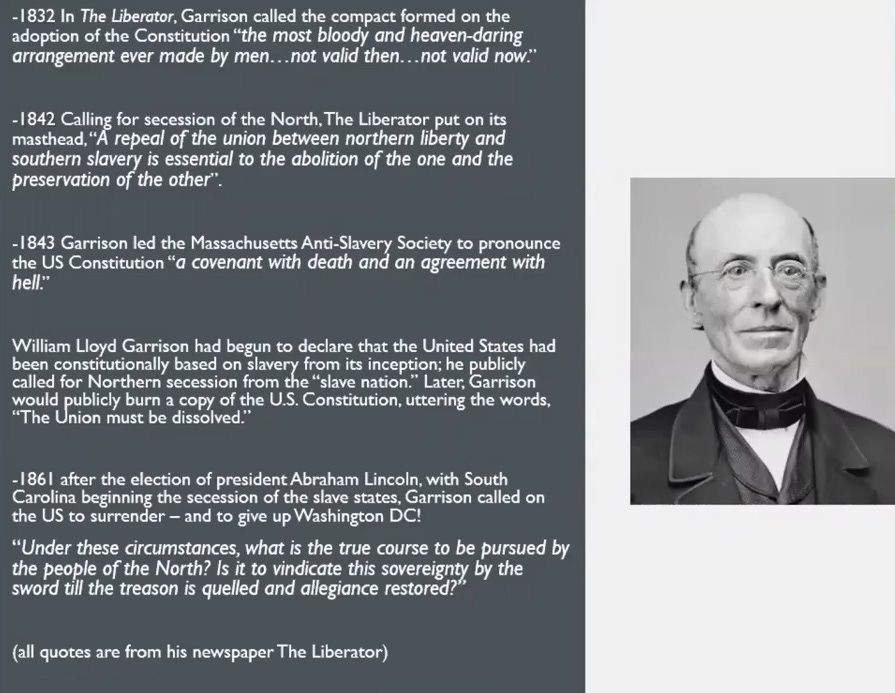
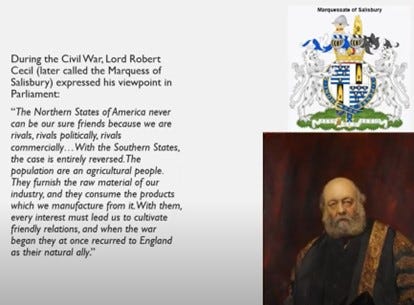
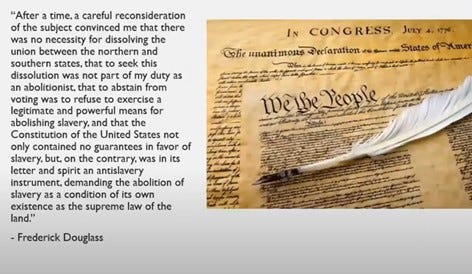
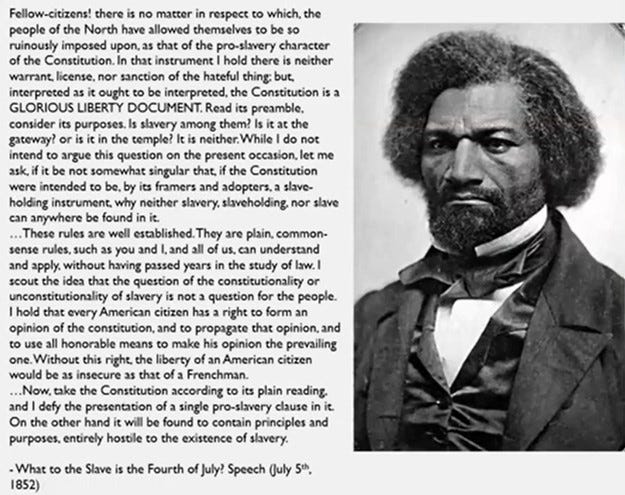
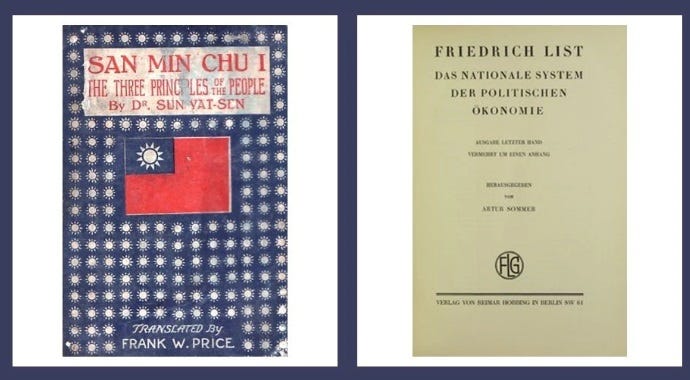

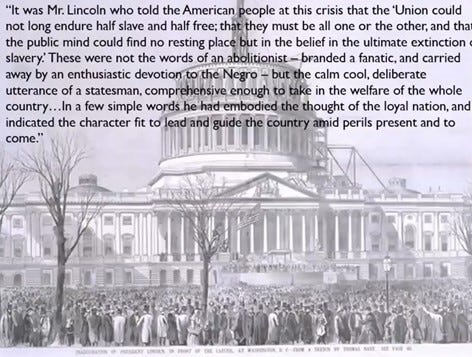
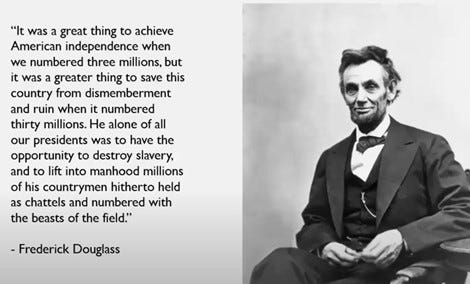
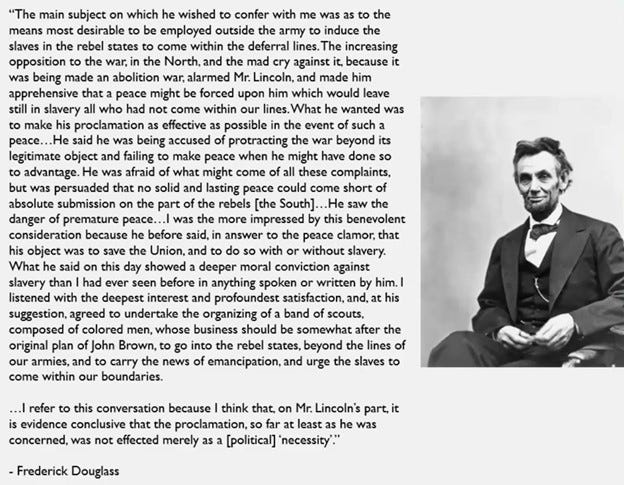
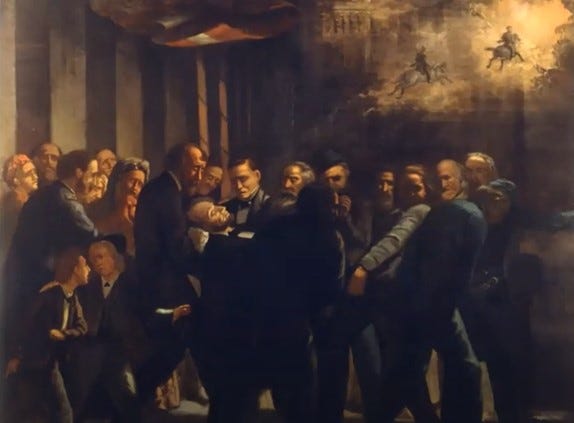
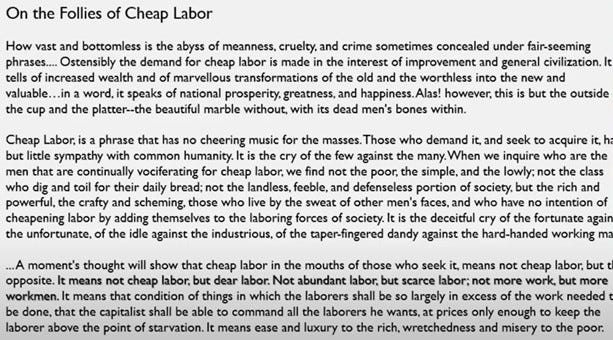
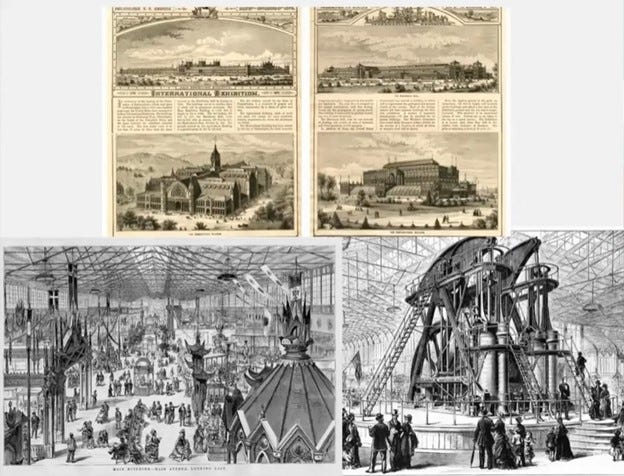
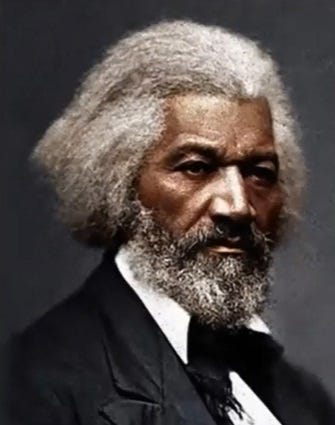
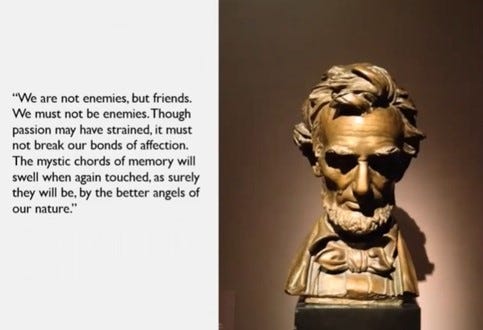
That was beautiful. We’re standing at an important crossroads. Or maybe the razor’s edge. Recognizing that even at our worst , we all, everyone, is operating in a system that has never served our humanity, and we are all trapped in it; that’s how we can go forward together. “Every path is the right path. Everything could've been anything else. And it would have just as much meaning.”
Thank you for this brilliant analysis and for sharing the important insights offered by Fredrick Douglas and his admiration for the values and principles expressed in the US constitution, even if they have been too often subverted, i.e., the fact that the evil institution of slavery was never condoned by this document.
Have you done an analysis of how Ben Franklin or any other founding fathers who promoted liberty, sovereignty and self-determination may have attempted to integrate these principles in their approach to relations with the nations of indigenous peoples who already inhabited the land that later became the United States? We know about the damage done by colonist and imperialist forces, but were there ever efforts by anyone to ask permission to co-inhabit the land and collaborate with mutual respect on sharing/exhanging resources and cultural assets? What role did the Iroquois confederacy play and what happened to that connection? Roxanne Dunbar-Ortiz addresses often ignored realities of rampant land theft, ethnic cleansing and genocide in her book "An Indigenous Peoples' History of the United States" that haunt us still today. Addressing this aspect of our history honestly and with humility needs to be a part of figuring out how to identify and build upon the positive and constructive innovations that the US brought forth, doesn't it? I'd greatly appreciate your thoughts and any references to work you or your colleagues have done in this area. Thanks again!